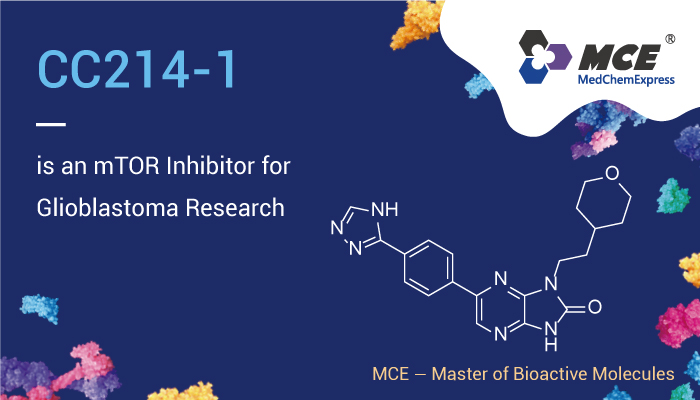mTOR (mammalian target of Rapamycin) is a protein that in humans is encoded by the mTOR gene. Then, mTOR is a serine/threonine protein kinase that regulates cell growth, cell proliferation, cell motility, cell survival, protein synthesis, and transcription. mTOR belongs to the phosphatidylinositol 3-kinase-related kinase protein family. mTOR integrates the input from upstream pathways, including growth factors and amino acids. mTOR also senses cellular nutrients, oxygen, and energy levels. Rapamycin inhibits mTOR by associating with its intracellular receptor FKBP12. The FKBP12-rapamycin complex binds directly to the FKBP12-Rapamycin Binding (FRB) domain of mTOR, inhibiting its activity.

CC214-1 is a mTOR inhibitor for glioblastoma research.
CC214-1 is a potentially efficacious mTOR inhibitor that induces autophagy, with an IC50 is 0.002 μM. Besides, CC214-1 proved to be useful as an in vitro tool compound for the exploration of mTOR kinase biology. Firstly, it (0-10 μM, 24 h) synergizes with rapamycin, inhibiting mTORC1 signaling and tumor cell proliferation. Secondly, it inhibited mTORC1 signaling in all glioblastoma cell lines tested, potently suppressing rapamycin-resistant 4E-BP1 and mTORC2 signaling. Moreover, it inhibited mTORC1-dependent 4E-BP1 and S6 phosphorylation in EGFRvIII-expressing glioblastoma cells, as well as blocked glioblastoma cells overexpressing wild-type EGFR. Importantly, it (2 μM, 24 h) mediated sensitivity to growth arrest in glioblastoma cells due to EGFRvIII expression and loss of PTEN.
It induced a transient expression of LC3B-II isoform and the conjugation of Atg12 to Atg5 indicative of the stimulation of the autophagy flux in the U87EGFRvIII cell line. Massively lipidated LC3B-I to LC3B-II subtype and induces autophagy in GBM39 cells. CC214-1 (5 μM, 0-48 h) massively lipidates LC3B-I to LC3B-II subtype and induces autophagy in GBM39 cells. CC214-1 (0-10 μM, 4 days) is efficient in inhibiting T-cell activation and the expression of T-cell activation markers.
In conclusion, CC214-1 is a potentially potent mTOR inhibitor that induces autophagy and can play roles in glioblastoma research.
Reference:
[1] Beatrice Gini, et al. Clin Cancer Res. 2013 Oct 15;19(20):5722-32.
[2] Ma Carmen Herrero-Sánchez, et al. Br J Haematol. 2016 Jun;173(5):754-68.